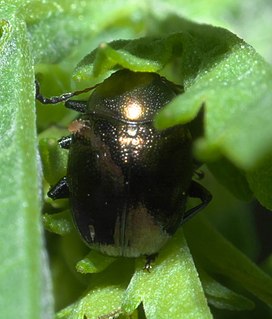
The Eumolpinae are a subfamily of the leaf beetles, or Chrysomelidae. It is one of the largest subfamilies of leaf beetles, including more than 500 genera and 7000 species. They are oval, and convex in form, and measure up to 10 mm in size. Typical coloration for this subfamily of beetles ranges from bright yellow to dark red. Many species are iridescent or brilliantly metallic blue or green in appearance.
Xanthonia is a genus of leaf beetles in the subfamily Eumolpinae. It is distributed in North and Central America, and in East, Southeast and South Asia.

The Spilopyrinae are a small subfamily of the leaf beetles, or Chrysomelidae. They occur in Australia, New Guinea, New Caledonia and Chile. They were formerly considered a tribe of the subfamily Eumolpinae. The group was elevated to subfamily rank by C. A. M. Reid in 2000. However, some authors have criticised this placement, preferring to retain them within the Eumolpinae.
Macrocoma lefevrei is a species of leaf beetle of Saudi Arabia, Oman, Yemen, Iran and Egypt. It was first described by Joseph Sugar Baly in 1878.
Macrocoma vanharteni is a species of leaf beetle of the United Arab Emirates, described by Igor Lopatin in 2008.
Colasposoma grande is a species of leaf beetle found in Yemen, Oman, Saudi Arabia and the United Arab Emirates. It was first described by Édouard Lefèvre in 1890. It was originally placed in the genus Eryxia, but was moved to the genus Colasposoma by Stefano Zoia in 2012.

Macrocoma is a genus of leaf beetles in the subfamily Eumolpinae. It contains about 100 species, which are found in tropical Africa, around the Mediterranian, on the Canary Islands, in western and central Asia, and in India.

Eumolpini is a tribe of leaf beetles in the subfamily Eumolpinae. It is the largest tribe in the subfamily, with approximately 170 genera found worldwide. Members of the tribe almost always have a longitudinal median groove on the pygidium, which possibly helps to keep the elytra locked at rest. They also generally have a subglabrous body, as well as appendiculate pretarsal claws.

Demotina is a genus of leaf beetles in the subfamily Eumolpinae. There are over 50 described species in Demotina. The genus is native to Asia, Australia and Oceania, though one species is an adventive species in the southeastern United States in North America. Some species are known to be parthenogenetic.

Typophorini is a tribe of leaf beetles in the subfamily Eumolpinae. The tribe contains approximately 100 genera, which are found worldwide. Members of the tribe are mainly characterized by antenna cleaners on the tibiae of the middle and hind legs. They also generally have a subglabrous body, as well as bifid pretarsal claws.
Hyperaxis is a genus of leaf beetles in the subfamily Eumolpinae. It is distributed in East and Southeast Asia.
Macrocoma leprieuri is a species of leaf beetle from North Africa and the Arabian Peninsula to the Horn of Africa. It was first described by Édouard Lefèvre in 1876, as a species of Pachnephorus.
Chloropterus lefevrei is a species of leaf beetle distributed from the Caucasus via Central Asia to Western Asia. It was first described by Edmund Reitter in 1890, who named it after Édouard Lefèvre.
Stethotes is a genus of leaf beetles in the subfamily Eumolpinae.

Dematochroma is a genus of leaf beetles in the subfamily Eumolpinae. It is mostly distributed in New Caledonia, though it is also found on Lord Howe Island, Norfolk Island and Timor. Adult beetles are often found at night feeding on leaves, and the larvae eat roots. It is possible the genus is polyphyletic or paraphyletic.
Goniopleura is a genus of leaf beetles in the subfamily Eumolpinae. It is found in Southeast Asia. It is sometimes treated as a subgenus of Aulexis.
Cleoporus is a genus of leaf beetles in the subfamily Eumolpinae. It is known from Asia.
Atomyria is a genus of leaf beetles in the subfamily Eumolpinae. It is distributed in Central Asia and Iran. In 2012, the genus was moved from the tribe Bromiini to the tribe Nodinini. In 2020, the genus was revised by A. G. Moseyko, who described a new species and transferred two species to Chloropterus, leaving only two valid species remaining within Atomyria.

Bromiini is a tribe of leaf beetles in the subfamily Eumolpinae. The tribe contains approximately 120 genera, which are found worldwide. They are generally thought to be an artificial group, often with a subcylindrical prothorax without lateral ridges and covered with setae or scales.







